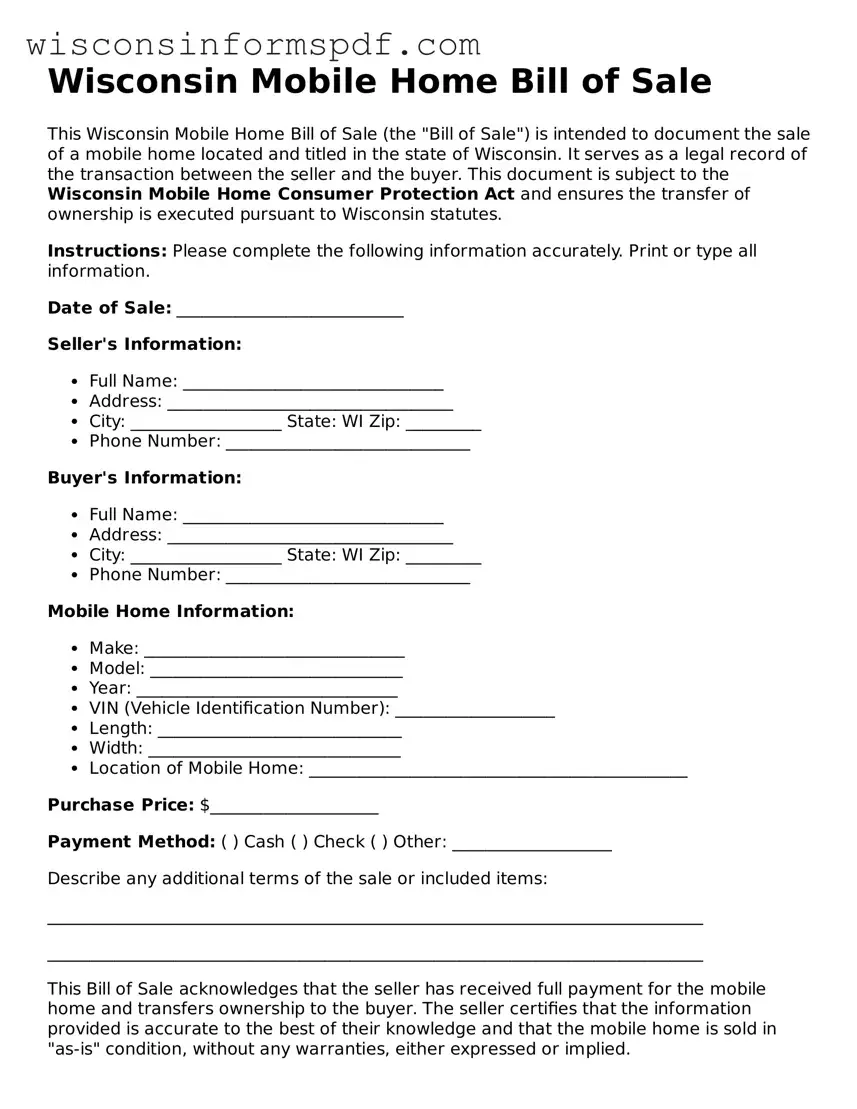The Vehicle Bill of Sale is closely related to the Wisconsin Mobile Home Bill of Sale form. Both documents serve as a legal record of the sale and purchase transaction, providing proof of ownership transfer from the seller to the buyer. They typically include information about the seller, the buyer, the sale price, and the specifics of the item being sold. In the case of the Vehicle Bill of Sale, this item is a car, motorcycle, or other vehicles, whereas for the Mobile Home Bill of Sale, it's a mobile home. This similarity in structure and purpose simplifies the process of transferring ownership and recording the transaction for legal and tax purposes.
The Real Estate Bill of Sale shares similarities with the Wisconsin Mobile Home Bill of Sale form, especially in the context of property transactions. Although the mobile home sale might include land (if the home is permanently affixed to it), often, it does not, making the document focused on the mobile home itself, akin to personal property. On the other hand, a Real Estate Bill of Sale is typically used for land or structures permanently attached to land. Both forms are critical for recording the transaction details and ensuring the legal transfer of ownership, including names, addresses, and the agreed-upon sale price.
A Boat Bill of Sale form is another document that mirrors the Wisconsin Mobile Home Bill of Sale in function. Just like the mobile home form, the Boat Bill of Sale documents the sale of a boat from one party to another, outlining details such as the make, model, year, and identification number of the boat, along with the sale price and the names of the buyer and seller. Both forms ultimately serve to verify the transaction and protect both parties by providing a legal record of the sale and ownership transfer.
The General Bill of Sale form is a broader document that shares the versatile nature of the Wisconsin Mobile Home Bill of Sale form. It is used to record the sale of various items, such as electronics, equipment, or other personal properties, from one individual to another. Similar to the mobile home bill of sale, it includes detailed information on the transaction, including the buyer's and seller's information, the description of the sold item, and the sale price. These forms are crucial for both buyer and seller as they provide a legal proof of purchase and sale.
The Firearm Bill of Sale is a specialized form but still comparable to the Wisconsin Mobile Home Bill of Sale in its purpose of documenting the transfer of ownership. It specifically records the sale of firearms from one individual to another, listing specifics such as the make, model, caliber, and serial number of the firearm, alongside the identities of the buyer and seller. While the nature of the item being sold differs significantly, the essence of both documents as tools for legal documentation and protection remains the same.
The Business Bill of Sale is similar to the Wisconsin Mobile Home Bill of Sale as they both record the transfer of substantial assets. Unlike the mobile home bill, which deals with the sale of a living space, the Business Bill of Sale covers the sale of an entire business, including its assets, inventory, and sometimes, the goodwill associated with it. The parallels lie in their mutual aim to formally document the details of the transaction such as the sale price, terms of sale, and information about the buyer and seller, providing a legal basis for the transfer of ownership.
The Equipment Bill of Sale closely aligns with the Wisconsin Mobile Home Bill of Sale in that it records the sale of specific items from the seller to the buyer. This document is often utilized for the sale of heavy or large equipment, detailing the item's identification details, the sale price, and the parties' details. The primary similarity lies in their foundational purpose: to provide a legally binding document that evidences the agreement between two parties, ensuring a smooth transition of ownership with clear terms outlined.

